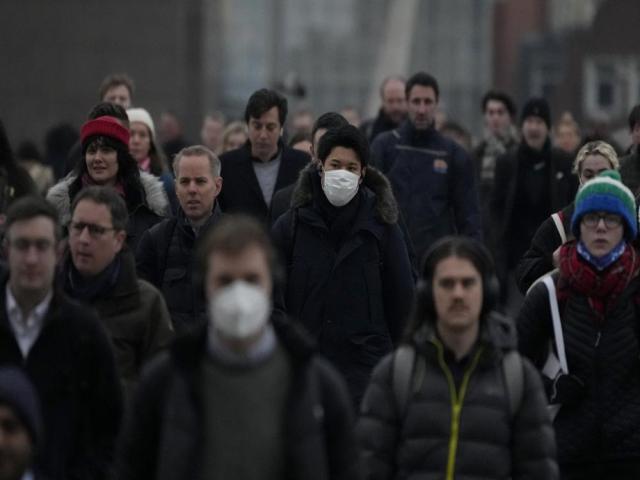UK to lift travel test requirements for the vaccinated

British Prime Minister Boris Johnson said Monday his government will remove coronavirus testing requirements for vaccinated people arriving in England, news hailed by the travel industry as a big step back to normality.
Johnson said that “to show that this country is open for business, open for travelers, you will see changes so that people arriving no longer have to take tests if they have been vaccinated, if they have been double vaccinated.”
Transport Secretary Grant Shapps is due to give details of the rule change later.
Tim Alderslade, chief executive of airline industry body Airlines U.K., said it was “a landmark day.”
“Nearly two years since the initial COVID restrictions were introduced, today’s announcement brings international travel towards near-normality for the fully vaccinated, and at last into line with hospitality and the domestic economy,” he said.
Currently, travelers who have had at least two vaccine doses must take a rapid coronavirus test within two days of arriving in the U.K. Those who are unvaccinated face stricter testing and quarantine rules.
The government had already eased travel rules earlier this month, removing the need to take a test before traveling to Britain and replacing lab-confirmed post-arrival PCR tests with cheaper rapid lateral flow tests.
Monday’s announcement applies to England. The other parts of the U.K. — Scotland, Wales and Northern Ireland — set their own public health policies but have generally adopted the same travel rules as England.
Coronavirus cases in Britain soared in December, driven by the extremely transmissible omicron variant, though hospitalizations and deaths have remained well below previous pandemic peaks. Britain has seen over 154,000 deaths in the pandemic, the second-worst toll in Europe after Russia.
Johnson’s Conservative government is also lifting mask mandates and other restrictions this week, and is relying on vaccinations and widespread testing to keep the virus in check.
The head of the World Health Organization is warning that conditions remain ideal for more coronavirus variants to emerge and says it’s dangerous to assume omicron is the last one or that “we are in the endgame,” while saying the acute phase of the pandemic could still end this year — if some key targets are met.
Tedros Adhanom Ghebreyesus, WHO’s director-general, laid out Monday an array of achievements and concerns in global health over issues like reducing tobacco use, fighting resistance to anti-microbial treatments, and risks of climate change on human health. But he said “ending the acute phase of the pandemic must remain our collective priority.”
“There are different scenarios for how the pandemic could play out and how the acute phase could end. But it’s dangerous to assume that omicron will be the last variant or that we are in the endgame,” Tedros told the start of a WHO executive board meeting this week. “On the contrary, globally, the conditions are ideal for more variants to emerge.”
“It’s true that we will be living with COVID for the foreseeable future and that we will need to learn to manage it through a sustained and integrated system for acute respiratory diseases” to help prepare for future pandemics, he said. “But learning to live with COVID cannot mean that we give this virus a free ride. It cannot mean that we accept almost 50,000 deaths a week from a preventable and treatable disease.”
In stark terms, Tedros also appealed for strengthening WHO and increasing funding for it to help stave off health crises.
“Let me put it plainly: If the current funding model continues, WHOis being set up to fail. The paradigm shift in world health that is needed now must be matched by a paradigm shift in funding the world’s health organization.”
People who aren’t vaccinated against COVID-19 are no longer allowed in France’s restaurants, bars, tourist sites and sports venues unless they recently recovered from the virus.
The new law came into effect Monday requiring a “vaccine pass” that is central to the government’s anti-virus strategy.
France is registering Europe’s highest-ever daily coronavirus infection numbers, and hospitals are continuing to fill up with virus patients, though the number of people in intensive care units has dropped in recent days.
The government has imposed few other restrictions amid the surge in the omicron variant, focusing instead on the vaccine pass, approved by France’s parliament and Constitutional Council last week.
Omicron is less likely to cause severe illness than the previous delta variant, according to studies. Omicron spreads even more easily than other coronavirus strains, and has already become dominant in many countries. It also more easily infects those who have been vaccinated or had previously been infected by prior versions of the virus.

Best Benefits of Onion Oil in Pakistan
- However, even properly prepared onion oil can be harmful for certain health conditions. Dressing is contraindicated

Lebanon can get IMF aid if Beirut makes reforms : Austrian FM
- Austria’s foreign minister said Wednesday that the European Union wants to help Lebanon escape its economic meltdown, but only if the country’s leaders

Selena Quintanilla Pérez (April 16, 1971 in Lake Jackson
- Selena Quintanilla Pérez (April 16, 1971 in Lake Jackson

Fashion that Has Great Potential in the Creative Industry
- Fashion that Has Great Potential in the Creative Industry